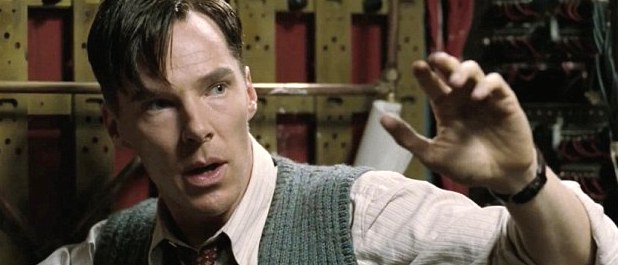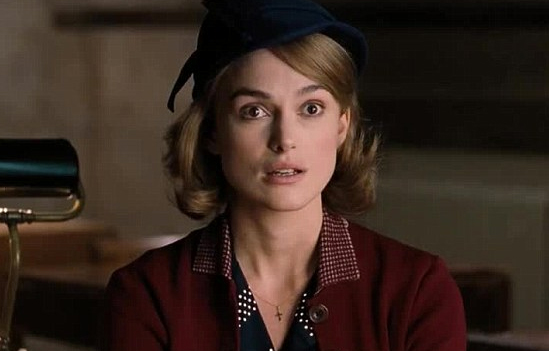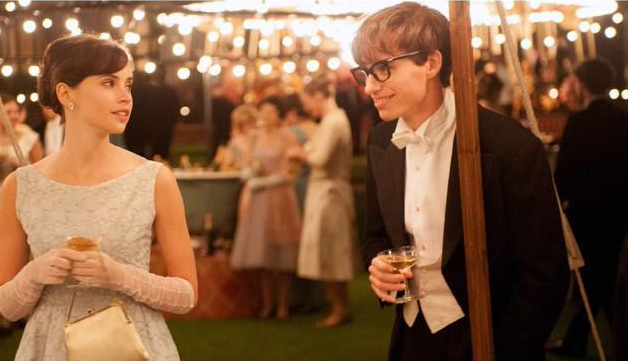Nathaniel's adventure in Toronto. Days 4 & 5
Two bonafide contenders for the Best Actor Oscar screened on two consecutive days so I can't help but pair them here for you. We'll surely say more about these movies when they open, because they're both looking like awards heavyweights. But, for now, reviews and some Oscar betting.

IMITATION GAME
In the opening voiceover, Alan Turing (Benedict Cumberbatch) admonishes someone (us?) to "pay attention. I won't repeat myself" but the story is exciting enough that you're sure to pay attention without the lecture. I mean, it's not every day you get to see a movie about a closeted homosexual genius mathematician secret war hero. Imitation Game has three acts but they play concurrently so we're weaving through Alan's adolescence in boarding school, Alan's top-secret war assignment, and Alan in the 1950s under police investigation. Naturally these three acts are related, not just by having the same protagonist, but by the theme of secrecy. How it informs, shapes, and obscures or destroys the things that matter like character, consequence, and emotional health.
 The middle story is the most thrilling as Alan races against the clock to break the Enigma Code during WW II. I think the charge from this section of the film comes from the editing, directing, and its beautifully judged ensemble performance. Turing's obsessive intellectual personality is thrown into vivid relief but also sours when its forced into interaction with others, sliding towards closed off, curt and superior. And Benedict maps all this out with great delicacy...
The middle story is the most thrilling as Alan races against the clock to break the Enigma Code during WW II. I think the charge from this section of the film comes from the editing, directing, and its beautifully judged ensemble performance. Turing's obsessive intellectual personality is thrown into vivid relief but also sours when its forced into interaction with others, sliding towards closed off, curt and superior. And Benedict maps all this out with great delicacy...
Among the actors playing government officials and the team of statisticians, mathematicians, and linguists working on the code, Matthew Goode is particularly good, pitching his frenemy role for both tension and lightening of the mood. His expert calibration also goes a long way in selling the collective character arc -- somewhat convenient in the screenplay - when it comes to a shift in team loyalties. Keira Knightley, as the team's unlikeliest member, a woman who is insanely great at puzzles, is just luminous again (second time this year, is Hollywood paying attention?). Knightley's deft handling of her role and arc as she moves from fully aware but chafing against her societal limitations and angrier and more proactive about them, is a great assett to the movie. She helps you understand why the antisocial Turing would be so thoroughly disarmed and charmed by her and act so atypically in her presence as they become more involved in each other's hearts.
With so many strong elements - the art direction, editing, and acting are all noteworthy - why isn't it a grander success? I think it's both its tidyness (the beats are all where you'd expect, outside of some key performance notes) and everything happens very quickly due to truncating these complicated stories to make room for three of them. The flashbacks and flashforwards are much flatter in the absence of the ensemble. The layering also makes the film a bit heavy-handed about its themes and sympathies. Particularly since you don't actually have to "pay attention," as the films warns because it lies and will glady repeat itself. The film's primary mantra is, in fact, repeated three times in the movie with diminishing returns, though the repetition is clearly meant to yield the opposite. It's a nifty little quote about people who no one thinks anything of doing the things that nobody else would think to do... or some such. (I'd recite it if my memory weren't so bludgeoned by seeing so many films back-to-back.) For all those reservations this is one of those films that's accessible, handsomely made, and easy to spend time with since it's far more entertaining than the subject matter would suggest.
Grade: B but the middle story is A-
Oscar Chances: Most definitely and in nearly all categories but particularly Actor, Art Direction and Adapted Screenplay
 THEORY OF EVERYTHING
THEORY OF EVERYTHING
A twist: Stephen Hawking was always in search of "The Theory of Everything" an elegant mathematical equation*, a quantum physics solution that would answer every question. Though the movie The Theory of Everything references this idea and search many times, it is not really about that unless you'd like to posit that "love" answers every question in which case, ewww, and let me wipe the mushy gloop off before we proceed.
All tidied up now we continue...
Love doesn't solve the challenging case of Stephen and Jane Hawking's marriage. The film is based on "Travelling to Infinity: My Life with Stephen," written by Jane about their marriage. We meet them both while they're studying in college and though Jane's friend who brings her to a social event is annoyed that they've stumbled into a veritable den of nerds, Jane (Felicity Jones) is immediately drawn to Stephen (Eddie Redmayne) and they talk for hours swiftly becoming college sweethearts. These early scenes are crucial to the success of the film, setting up as they do an intense reciprocal love that will then be challenged again and again as Stephen is diagnosed with "motor neuron disease" which we now call ALS. (There's a handful of signs that something is wrong early on, little twitches and stumbles that are the equivalent of a screen beauty coughing a single drop of blood onto her kerchief. ) The actors have undeniable chemistry and you understand when Jane impulsively decides to marry a man the doctors tell her will be dead in just two years.
 Stephen falls apart as he loses control of his body
Stephen falls apart as he loses control of his body
The doctors were wrong as it turns out and the famous physicist is actually still alive today in 2014! So the Hawking marriage stretches on and they have children and the film leaps forward until Stephen can no longer function on his own but sits in a wheelchair being spoonfed his meals. Eddie Redmayne proves himself a great physical actor here, ably translating the betrayals of Hawking's body for us. I would have liked to see what he could do with a more gradually declining physicality (the film is in favor of time jumps) but people like transformations and Edde performs the trick starting out as a gangly student and then contorted and trapped in a wheelchair, his great mind still active and his speech more and more illegible. Meanwhile the strain of being mother, nursemaid, wife, and everything all at once is wearing Jane down until she meets a kindly choir conductor at church named Jonathan (Charlie Cox) who is a widower and agrees to help the family. Stephen, initially wary, decides to like him too (there's just a great moment between the two actors involving a spoonful of peas that is just adorable). Naturally this works for a time but isn't a long term solution.
The best thing about The Theory of Everything, which is handsomely mounted, beautifully scored, and well acted but hemmed in by its stereotypical Oscar baitiness, is its clear-eyed look at a complicated difficult marriage. Felicity Jones is particularly strong in her early scenes, shocked by this rug pulled out from under her but defiantly charging ahead into a difficult life. Unfortunately the film also wants to be about Hawking's brilliance as a physicist and these competing demands mean the film has to hedge and shortcut its way through the story, with sudden realizations, big time jumps, montages, and the like. But whenever it threatens to become just a "and then this happened... and then this happened... and then this happened" biopic, the chemistry between the principles rescues it.
It earns its admittedly sentimental ending but the golden hue is really overdoing it, people! (And by people I mean director James Marsh and cinematographer Benoit Delhomme). The film is beautifully even-handed, all told, celebrating both Jane and Stephen's hard-won triumphs and stamina.
*I don't actually know what I'm talking about there so that sentence could read all wrong because math is jibberish to me. I had such trouble with it in school.

Grade: B but the romantic drama is stronger than the grade implies
Oscar Chances: Most definitely and in nearly all categories but particularly likely in Actor, Actress, and Original Score (Johan Johansson).
 LET'S TALK BEST ACTOR
LET'S TALK BEST ACTOR
While both Redmayne and Cumberbatch will likely face off at the Golden Globes and the Oscars, it's no done deal yet. In super competitive years shocking omissions are always possible. Still, Eddie Redmayne playing Stephen Hawking is the nearest the category has to a "lock" given that a) he's very good in the movie but mostly b) male actors get an automatic Oscar advantage when they play disabled characters; it's the transformative male equivalent that the dread "de-glamming" is for female actors. Benedict Cumberbatch may well have a trickier path to a nomination with a less showy role. Turing is a fascinating character but he's also reserved and secretive so Benedict isn't truly able to chew the scenery, which Oscar prefers, but nibble at it daintily and interiorize his hunger for it.
In this early round of battle, Redmayne has the definite realistic edge but I think I prefer Cumberbatch. I'll happily see both again to determine my actual vote.